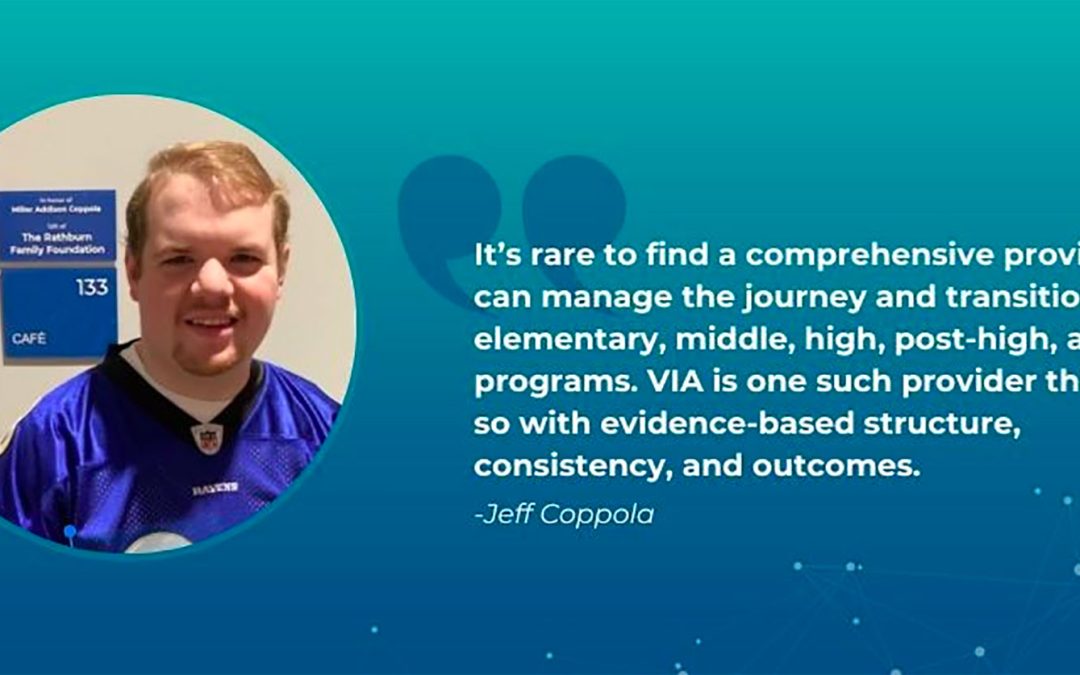Thank you to Jeff Coppola for sharing this story and for his service on VIA’s Board of Directors as the Chair of our Nominations and Governance Committee.
Full disclosure, I have the privilege of being a member of VIA’s Board of Directors. I do so as a believer in the mission and impact VIA has had over the last 25 years on the autism community in Central Virginia. But, for now, I’m not speaking as a board member, but rather as a parent.
24 years ago, Mary and I got a call on a Friday, and by Monday we were parents. We picked Addison up from UVA and after all the hoopla we put Addison in his infant carrier and into the car. Mary sat beside him in the back seat and as I looked into the rearview mirror to back out of the parking spot our eyes locked; a few seconds passed and she said, “Now what?” My response was something like, “Pretty sure it’s a little late for that question, honey, but we will figure it out like we always do.”
Addison, like most, was diagnosed with autism just before his third birthday. Kluge, Johns Hopkins, and a specialist in Augusta County all arrived at the same place. And like most stories you hear, it really was like aliens came and took Addison away, as he was progressing to the point where we enrolled him in the pre-K program at the Montessori School on Pantops. But in hindsight, the signs were there. More importantly, thanks to Mary, we engaged every available resource at the time, enrolling him in Albemarle’s pre-K autism program at Stone Robinson, where Addison began his autism journey.
We left Charlottesville in 2003 and relocated to Baltimore, where Mary and I met. We were very fortunate that the autism and medical resources in the greater Baltimore area during Addison’s toddler, pre-teen, and teenage years were plentiful, as Addison’s autism journey is further complicated by epilepsy and adult-onset type II diabetes. Ultimately, Mary and I wanted to return to Charlottesville, and we did so in 2018.
When we relocated back to Charlottesville, we were fortunate enough to work with Suzanne Fladd at Albemarle County Schools (now Assistant Director of Education Programs at VIA) to have Addison enrolled in VIA’s post-high program. With the stress of relocation, which included moving out of his home of 15 years and leaving behind a school and staff focused on Addison’s best interests and strengths since he was 8 years old, VIA provided both transitional outpatient services and resources that made his transition as seamless as possible while we established a new routine. Another benefit of returning was that Virginia funds education up to an individual’s 22nd birthday, whereas Maryland only funds up to the 21st year. This afforded Addison an extra year of funded structure and resources.
However, we were facing the same moment all parents of autistic children face eventually – the moment the local school district no longer funds all the programs and supporting therapies your child’s Individualized Education Plan, or IEP, provides.
Many will have heard the term, “on the edge of the cliff,” or, “over the cliff,” referring to the questions of what’s next for my child, where will they go for the structured support and environment they have thrived in for the past 10+ years, and how do we afford this? Beyond those questions, the number one concern that keeps parents of special needs children up most nights is, “who is going to take care of our child when we are gone?”
It’s rare to find a comprehensive provider who can manage the journey and transitions from elementary, middle, high, post-high, and adult programs. VIA is one such provider that does so with evidence-based structure, consistency, and outcomes. But of equal importance, VIA provides resources that help parents navigate the complexities across the myriad of local, state, and federal programs that can help families financially afford all of these services. VIA supports families facing the “cliff”.
As parents, we all want what is best for our children. We want them to be happy, productive contributors to their communities, and have a level of self-esteem that sustains them through the good and bad times. VIA’s Center for Adolescent and Adult Autism Services provides the structure in which our autistic children may thrive as happy and productive adults who contribute to their families and communities while building their self-esteem and independence every single day. VIA’s adult services program provides support through day support services, community engagement, vocational training and employment through VIAble Ventures, and now supportive employment.
My hope is that through sharing our story, through the lens of parents of an autistic adult, and how VIA has impacted our lives, especially Addison’s, you will share our story with your family and friends, along with VIA’s incredible mission.
